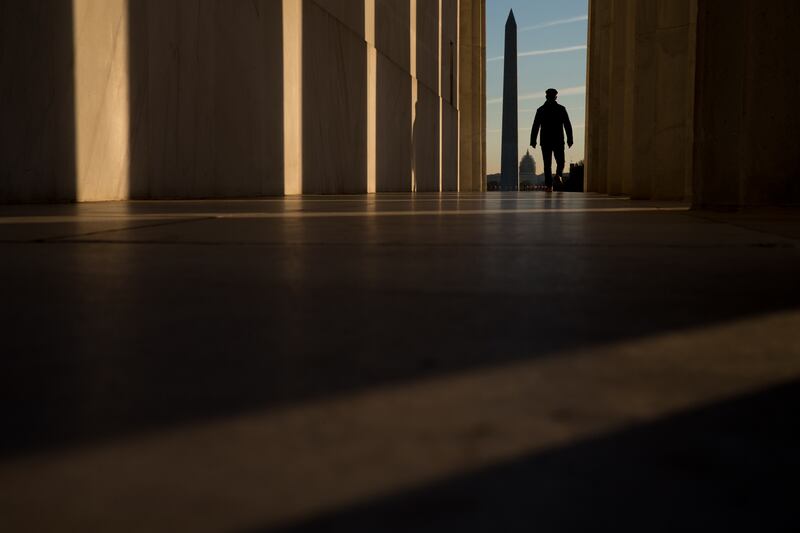SALT LAKE CITY — The Rev. Martin Luther King Jr. had a sore throat and a slight fever, so he decided not to deliver a planned speech on what would be the last evening of his life. But he showed up at the Bishop Charles Mason Temple in Memphis, Tennessee, anyway, and as a storm raged outside, delivered what is today known as the “I’ve Been to the Mountaintop” speech.
In the improvised remarks, the Rev. King said he saw God at work in the chaos and fury of the civil rights movement. “Something is happening in our world. The masses of people are rising up.” He was happy, he said, to live in a time in which people were finally grappling with the problems men have been grappling with throughout history. And the Rev. King also hinted at how America could get through its coming dark days in April 1968:
“All we say to America is, ‘Be true to what you said on paper.’”
It was a shoutout to promises of the past, promises that America’s flawed founders had made nearly 200 years earlier.
Similarly, when Abraham Lincoln spoke briefly at a cemetery in Gettysburg, Pennsylvania, he reminded a hurting, fractured nation of a principle it committed to paper in 1776: “All men are created equal.”
Those speeches, and the documents to which they refer, evoke moral leadership, the kind that catapulted an infant nation, an experiment in self-governance, to be a moral exemplar throughout the world.
As Independence Day approaches, America limps to her party, hobbled by a raging pandemic, widespread economic distress and weeks of protests over racism and police brutality.
Just six years shy of its 250th anniversary, can America maintain its place as a moral leader in the world? Theologians and policymakers across the country say yes — and not despite our failures, but because of them.
Recently, one Harvard professor called America a “failed social experiment.” And the leaders of six leading divinity schools and seminaries issued a statement calling the actions of the U.S. president “morally bankrupt.”
But it is the foundational documents — The Declaration of Independence and the Constitution — the blueprints on which Ronald Reagan’s “shining city on a hill” was built, that still govern the nation. “We’ve got plenty of problems — I don’t dispute that for a minute — but I think we are very much a force of good in the world in what we aspire to and what most Americans still believe in,” said U.S. Sen. Mike Lee, R-Utah.

Our ‘moral promise’
America wasn’t always seen by the rest of the world as a shining city on a hill. “It was probably not possible to think of America as such a nation in the 19th century,” said the Rev. Robert Franklin, professor of moral leadership at the Candler School of Theology at Emory University in Atlanta, noting both slavery and the removal of native Americans as the nation’s “original sins.”
Outside of the U.S., the idea of American leadership didn’t take hold until after World War I and the formation of the League of Nations, and later the United Nations, the Rev. Franklin said. Once those groups were established, “there was a natural search for leaders who set a tone at the top. Who sets the tone for what it means to be socially responsible, concerned about the common good of nations, rather than its own political and economic strength and well-being. Who cares about the whole?”
The Rev. Franklin, who is also president emeritus of Morehouse College and author of the new book “Moral Leadership,” said that America’s reputation as a moral exemplar was enhanced by its role in both world wars and its dealings with what was then the Soviet Union. “America earned a lot of moral credibility then, perhaps more than she deserved,” he said. The nation’s reputation was further enhanced by the emergence of the Rev. King as a civil rights leader and then the Rev. King winning the Nobel Peace Prize in 1964, he said.
But the foundation of America’s moral leadership was laid in its founding documents, which put forth a vision for governance that has inspired people around the world.
“You can read a lot into the soul and zeitgeist of the American people by looking at our founding documents,” said Lee, author of the 2019 book “Our Lost Declaration.”
“The declaration’s words are timeless and beautifully aspirational and elegant: the idea that we have inalienable rights endowed by our creator to life, liberty and the pursuit of happiness, and that governments are instituted among human beings by the consent of the governed, and they’re there to serve the people, not the other way around.”
Similarly, David DeCosse, director of campus ethics programs at the Markkula Center for Applied Ethics at Santa Clara University, said that the founders’ radical premise — that all men are created equal, which he has modified to “persons” — is central to America’s moral authority.
“To me, that is the moral heart, the moral promise, and the moral standard by which we should judge ourselves,” DeCosse said. “I would say that a lot of people and a lot of countries do not affirm that all persons are created equal, so we rightfully stand out in that regard. But if we are going to be truly moral, we have a responsibility to live up to those words.”
In 1932, President Franklin D. Roosevelt said that the U.S. presidency is not an administrative office. “That’s the least of it,” he said. “It is preeminently a place of moral leadership. All our great presidents were leaders of thought at times when certain historic ideas in the life of the nation had to be clarified.”
Roosevelt, history shows, had his own moral failings, to include marital infidelity and the establishment of internment camps for Japanese American citizens, but his observation suggests that the moral leadership of the nation cannot be separated from the moral leadership of its president.
That’s the position of the divinity school and seminary leaders who said in a June 23 joint statement the response of President Donald Trump to the protests over the killing of George Floyd by Minneapolis police was “morally bankrupt.”
The leaders said the protests, combined with the pandemic and the economic fallout from COVID-19, are societal crises compelling the nation to “rethink our values.”
“This can only be done with good moral leadership,” they said.
In his first inaugural address in 1789, George Washington said he hoped “that the foundations of our national policy will be laid in the pure and immutable principles of private morality.” He called on “free government” to exemplify the attributes that will make its citizens proud and “command the respect of the world.”
Despite criticism of Trump’s leadership, many Americans believe the hand of God is visible in his presidency, particularly through his appointment of some 200 judges,— presumably conservative — to the courts. A Pew Research poll released in March said 27% of respondents believe Trump’s election was part of God’s plan.
The need for public and private morality for leadership doesn’t seek perfection from its leaders, but alignment with the principles professed in America’s founding documents.

Faults in our stars
Matthew E. Mason, a history professor at Brigham Young University and co-director of Historians Against Slavery, said that from its beginning, America’s failure to rise to its own vision of equality and justice raised questions about its moral authority.
Currently researching the politics of slavery between the U.S. and Great Britain at the time of the Revolutionary War, Mason said slavery was part of the larger debate between the two warring countries, over “the degree to which the American political experiment was a model for other countries.”
“The United States was trying to establish itself as a legitimate nation on the world stage and to do that, they had to appeal to big ideas,” he said.
Media attention to slavery, such as in The 1619 Project of The New York Times, is incomplete when it doesn’t tell the full story, Mason said. “It is better to tell the story of 1619 in Jamestowne by telling the story of both the ‘20-odd negroes’ being sold, along with the first representative assembly meeting to represent the landowners at Jamestowne. That captures the American dilemma, the complexity of American history in both of those themes: racial bondage and representative government.”
“But historians are more comfortable with complicated narratives than other people are,” he said.
Peter Singer, a bioethicist at Princeton University, said that America has at times acted as a moral leader. “Maybe in 1918-19, when Woodrow Wilson insisted on national self-determination as part of the peace settlement. But then America retreated into isolationism and gave up its leadership.”
Or, he said, “Maybe after the Second World War when Eleanor Roosevelt got the Universal Declaration of Human Rights accepted and the U.S. was widely seen as the leader of the ‘free world’ although that leadership was tarnished by its support for dictators in many countries.”
But it is in failures, and our response to them, that both individuals and nations make moral progress, said Franklin, at Emory University. He likes to quote Alexis de Tocqueville, who said, “The greatness of America lies not in being more enlightened than any other nation, but rather in her ability to repair her faults.”
“Once a leader or an institution says ‘we got this wrong and we want to make good,’ there are few messages more resonant and powerful for a moral leader than that,” Franklin said.
“I embrace de Tocqueville’s claim about the possibility for moral repair, but it does require moral leadership,” he said.
BYU’s Mason believes that the founding documents and the ideas they express could be the key to bringing America together again. “Other nations have had a common religion, or a common language, or a common ethnicity. America doesn’t have any of those. So from 1776, we’ve posited this unusual idea that it’s going to be political ideals that hold us together.”
As for Lee, the U.S. senator from Utah, he bristles at suggestions that the American “experiment” has failed or that the country has lost what many people believe was a divine blessing on its people and land.
“That is not to say that we have arrived or have no more need to improve. But we have, since our founding, occupied a special place in that we’re a country founded on a set of ideals that we have often failed to live up to, but we aspire nonetheless to those ideals,” he said.
“Even at the time of our founding, we were doing a lot of things that were not morally defensible, including slavery and a lot of other bad policies that we’ve long since abandoned. But overall, I think our moral arc has tended toward the good, and overall our aspirations are still good and we as a people are still good.”


 alt=Jennifer Graham
alt=Jennifer Graham